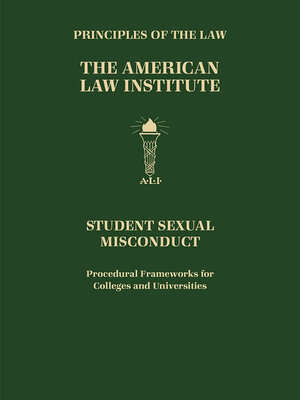Principles of the Law, Student Sexual Misconduct: Procedural Frameworks for Colleges and Universities
ebook
By The American Law Institute

Sign up to save your library
With an OverDrive account, you can save your favorite libraries for at-a-glance information about availability. Find out more about OverDrive accounts.
Find this title in Libby, the library reading app by OverDrive.



Search for a digital library with this title
Title found at these libraries:
| Library Name | Distance |
|---|---|
| Loading... |
School administrators in large and small, and public and private, colleges and universities will greatly benefit from this guidance that seeks to harmonize policies for procedures to respond to, investigate, and resolve allegations of sexual assault and related misconduct.
Procedural issues have given rise to a great deal of controversy on a range of matters, including the burden placed on complainants, the rights of the accused, and the standard of proof for finding violations. In addition to considering constitutional due-process constraints that apply to public universities, this publication also outlines fair procedures that both public and private schools can adopt as a matter of policy.
This subject matter involves sources of law that are in the midst of rapid evolution. In recent years, the legal landscape facing colleges and universities has changed dramatically, as a result of new case law, new state and federal legislation, and shifting federal guidance and regulation that continues to evolve today. The publication indicates when best practices differ from the federal regulations in effect at the time drafting of the project was completed in May 2022. It provides a useful framework for the ongoing study and improvement of the procedures that govern these issues.
Chapters cover Reporting; Inquiries and Investigations; Informal Resolution; Formal Resolution; Sanctions; Appeals; Integrity of Process; and Internal Student Discipline and the Criminal Justice System, among other topics. This publication's scope is the procedural frameworks for responding to, investigating, and resolving allegations of misconduct, rather than the efforts that should be made to help prevent those occurrences or the substantive standard that should apply to the conduct at issue. The work does not address the substantive definitions of prohibited conduct in college and university settings.
Reporters:
E. Thomas Sullivan, University of Vermont, Burlington, VT [from October 2021]
Vicki C. Jackson, Harvard Law School, Cambridge, MA [January 2015 to November 2021]
Associate Reporter:
Suzanne B. Goldberg, Columbia Law School, New York, NY [January 2015 to January 2021]







